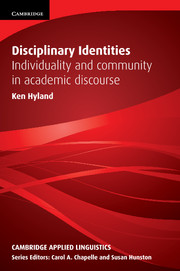Book contents
- Frontmatter
- Contents
- Series editors’ preface
- Preface
- Acknowledgements
- Notes on corpora and abbreviations
- 1 Identity: Interaction and community
- 2 Discipline: Proximity and positioning
- 3 Investigating identity
- 4 Identity in representational genres
- 5 Self-representation in academic bios
- 6 Culture: Authority and visibility
- 7 Reputation: Individuality and conformity
- 8 Gender: Disciplinarity and positioning
- 9 Identity, disciplinarity and methodology
- Appendix: Items with potential metadiscourse functions
- References
- Name Index
- Subject Index
5 - Self-representation in academic bios
Published online by Cambridge University Press: 09 February 2023
- Frontmatter
- Contents
- Series editors’ preface
- Preface
- Acknowledgements
- Notes on corpora and abbreviations
- 1 Identity: Interaction and community
- 2 Discipline: Proximity and positioning
- 3 Investigating identity
- 4 Identity in representational genres
- 5 Self-representation in academic bios
- 6 Culture: Authority and visibility
- 7 Reputation: Individuality and conformity
- 8 Gender: Disciplinarity and positioning
- 9 Identity, disciplinarity and methodology
- Appendix: Items with potential metadiscourse functions
- References
- Name Index
- Subject Index
Summary
While every social encounter entails projections and attributions of identity, the biographical statement which accompanies a research article is probably the most explicit public assertion of selfrepresentation in scholarly life. It sits in stark contrast to the prescribed anonymity of the article itself, which has been stripped of identifying information for blind peer review, and generally approximates to conventions which discourage too much personal exposure. In this context, then, the bio provides writers with an opportunity to construct a disciplinary-aligned presence and shape a professionally credible self. Surprisingly, however, it is also a somewhat disregarded genre which has largely escaped the notice of discourse analysts. We know little, for example, of its typical structure or of the language writers use to present themselves in it. Do established celebrities construct the genre in the same way as novices? Is there a common pattern of self-representation across disciplines? Do male and female academics do things similarly?
In this chapter I seek to rectify this neglect and address these questions, offering an account of the biographical statement by drawing on 600 bios in three disciplines. It turns out that, despite its brevity, the bio is an important means of representing an academic self through the recognition of collective values and membership.
Bios and situated identity claims
Readers, apparently, are interested in knowing more about the person behind the words when they read a research article, and publishers are prepared to indulge them. In the academic bio we find a rhetorical space where, in 50 to 100 words, authors are able to reflexively craft a narrative of expertise for themselves, albeit within the tight constraints of a relatively unvarying genre. The bio, then, is a key opening for academics to make a claim for a particular identity by the careful recounting of achievement. It is also an authentic statement of identity whose linguistic choices are available for analysis.
Authenticity and purpose
As I have noted (see 3.4), a great deal of identity research focuses on what people say about themselves in formal interviews (e.g. Block, 2006).
- Type
- Chapter
- Information
- Disciplinary IdentitiesIndividuality and Community in Academic Discourse, pp. 98 - 122Publisher: Cambridge University PressPrint publication year: 2012



